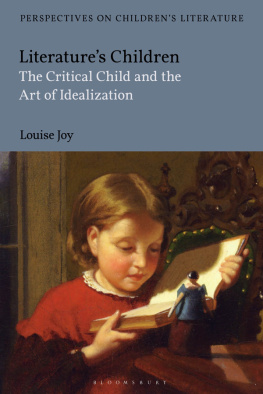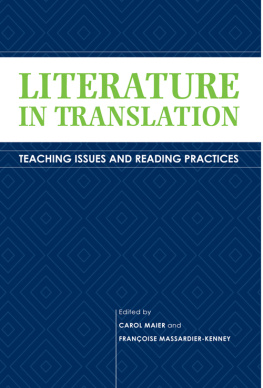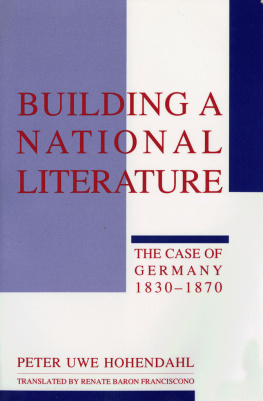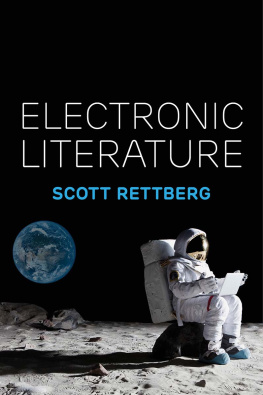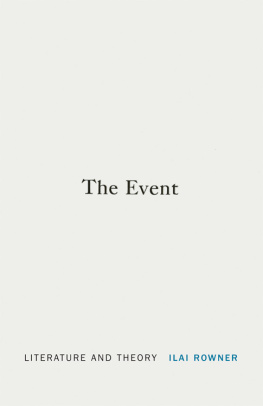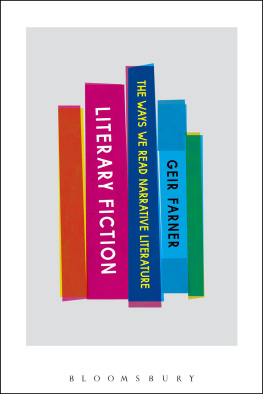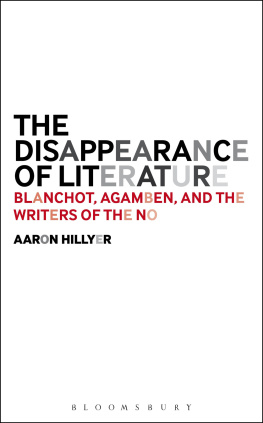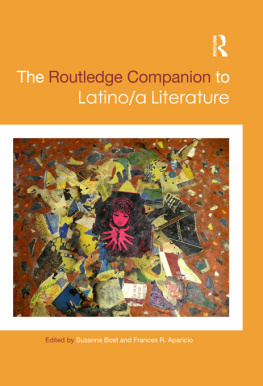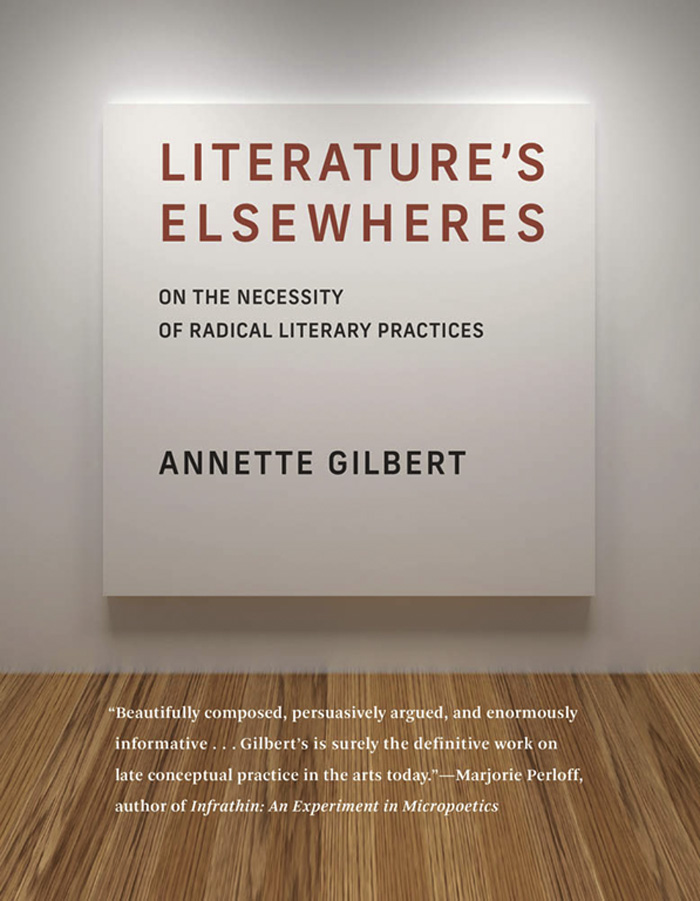
Literatures Elsewheres
Literatures Elsewheres
On the Necessity of Radical Literary Practices
Annette Gilbert
translated by the Cadenza Academic Translations team and Antonia Hirsch
The MIT Press
Cambridge, Massachusetts
London, England
2022 Massachusetts Institute of Technology
All rights reserved. No part of this book may be reproduced in any form by any electronic or mechanical means (including photocopying, recording, or information storage and retrieval) without permission in writing from the publisher.
The MIT Press would like to thank the anonymous peer reviewers who provided comments on drafts of this book. The generous work of academic experts is essential for establishing the authority and quality of our publications. We acknowledge with gratitude the contributions of these otherwise uncredited readers.
This book was set in Arnhem Pro and Frank New by New Best-set Typesetters Ltd.
Library of Congress Cataloging-in-Publication Data
Names: Gilbert, Annette, 1975- author. | Hirsch, Antonia, translator. | Cadenza Academic Translations, translator.
Title: Literatures elsewheres : on the necessity of radical literary practices / Annette Gilbert ; translated by Cadenza Academic Translations team and Antonia Hirsch.
Other titles: Im toten Winkel der Literatur. English
Description: Cambridge, Massachusetts : The MIT Press, [2022] | Includes bibliographical references and index.
Identifiers: LCCN 2021011598 | ISBN 9780262543415 (paperback)
Subjects: LCSH: LiteraturePhilosophy. | Art and literature. | Literature, ModernHistory and criticismTheory, etc. | Literature, ExperimentalHistory and criticism. | Publishers and publishing.
Classification: LCC PN45 .G5273513 2022 | DDC 801dc23
LC record available at https://lccn.loc.gov/2021011598
10987654321
d_r0
Contents
Becoming a Literary Work
By Way of Introduction
Prologue: in Deep Slumber
In 2014, Scottish conceptual artist Katie Paterson founded the Future Library. Each year, for the next 100 years, a well-known author will contribute a text to this library. These future texts will be carefully kept in the Deichmanske Bibliotek, Norways biggest public library; however, they will not be publicly accessible. The authors have committed to nondisclosure regarding their submissions, and only the titles of their works will be available. After 100 yearsin the year 2114this collection will be printed and made available to the public in a limited edition of 1,000 copies each. The books will be printed on paper made from the trees of a forest that the artist has planted specifically for this purpose.
Those who are alive today will probably be unlikely to experience this event. Canadian writer Margaret Atwood was the first author to entrust a text to the Future Library during a solemn ceremony in the summer of 2014. She immediately expressed her enthusiasm for the idea: Theres something magical about it, says Atwood. Its like Sleeping Beauty. The texts are going to slumber for a hundred years and then theyll wake up, come to life again. Its a fairytale length of time. She slept for 100 years. What convinced Margaret Atwood of the virtues of the project was the hope of sending a message in a bottle from the present to a yet unborn generation:
How strange it is to think of my own voicesilent by then for a long timesuddenly being awakened, after a hundred years. What is the first thing that voice will say, as a not-yet-embodied hand draws it out of its container and opens it to the first page?
I picture this encounterbetween my text and the so-far non-existent readeras being a little like the red-painted handprint I once saw on the wall of a Mexican cave that had been sealed for over three centuries. Who now can decipher its exact meaning? But its general meaning was universal: any human being could read it.
It said: Greetings. I was here.
This vision, however, requires substantial faith in the future, since it is impossible to know whether humanity will still exist at all in 100 years time. Atwood, well known for her dystopias, is aware of this fact, too: I am sending a manuscript into time. Will any human beings be waiting there to receive it? Will there be a Norway? Will there be a forest? Will there be a library? Its hopeful to believe that all of these elementsdespite climate change, rising sea levels, forest insect infestations, global pandemics, and all of the other threats, real or not, that trouble our minds todaywill still exist.
In response to these concerns, the projects initiator, Katie Paterson, made a tremendous effort to ensure the continued existence and successful completion of her projecteven beyond her own death: Weve done a lot of preventative measuresthings like treating the seedlings themselves with a special kind of wax so that bugs cant get at them. Even Margaret Atwood contributes her mite and, with what is at her disposal, ensures that her one and only copy of her text will survive its 100-year storage: it is handwritten on archival paper in a special, nonfading ink, she discloses. In the event that the cultural technique of book printing will have been lost in 100 years time, Paterson is also having a printing press stored inside the library.
In addition, the artist deploys a huge institutional apparatus to safeguard the project in the long term: a foundation established specifically for this purpose; the state, the city, a society for urban development, public arts and culture funding agencies, an architects office, and Patersons two galleries are involved in the project. Through the galleries, you can purchase certificates that ensure that you (or rather: your descendants) will receive a copy of the printed edition of all future texts. Against this background, Paterson is convinced: It doesnt matter if Im there or not, though. The rituals will keep going.
Regardless of whether the project will ultimately be completed: as a conceptual artwork with an open outcome, it has already become a crucial part of the artists uvre and inscribed itself into art history. Conversely, the strangely indeterminate status of the textswhich will be sealed away for a very long timehas so far hardly been publicly discussed. It was Margaret Atwood who articulated this blind spot rather casually in one of many interviews: Future Library isnt just a visual art project. Its a literary art project. Katie is the form, and Im the content. So the visual part of it is the forest and the recording of the forest and the placing of the things within the library. As a score for all the texts to be written it is very much a John Cage structure: one note a year for the next hundred years. It is striking that, apart from this interjection, hardly anybody talks about the Future Library as a literary artwork. No one speaks of the future content of the librarythe texts submittedeven though, for the authors involved, the stakes are much higher than they are for Paterson. Their texts remain under lock and key for all these years; they are not performed and executed.
Despite the enormous public attention that Atwoods participation in the project and the submission of her manuscript have attracted, her text will be deprived of its fulfillment as a work of literature for 100 years: Atwoods text occupies a strangely paradoxical state as a media object. A work by a prolific major author widely publicized but paradigmatically not published in any conventional sense of the term, it exists, at least for the next hundred years, in a highly inaccessible print run of one.
Next page

